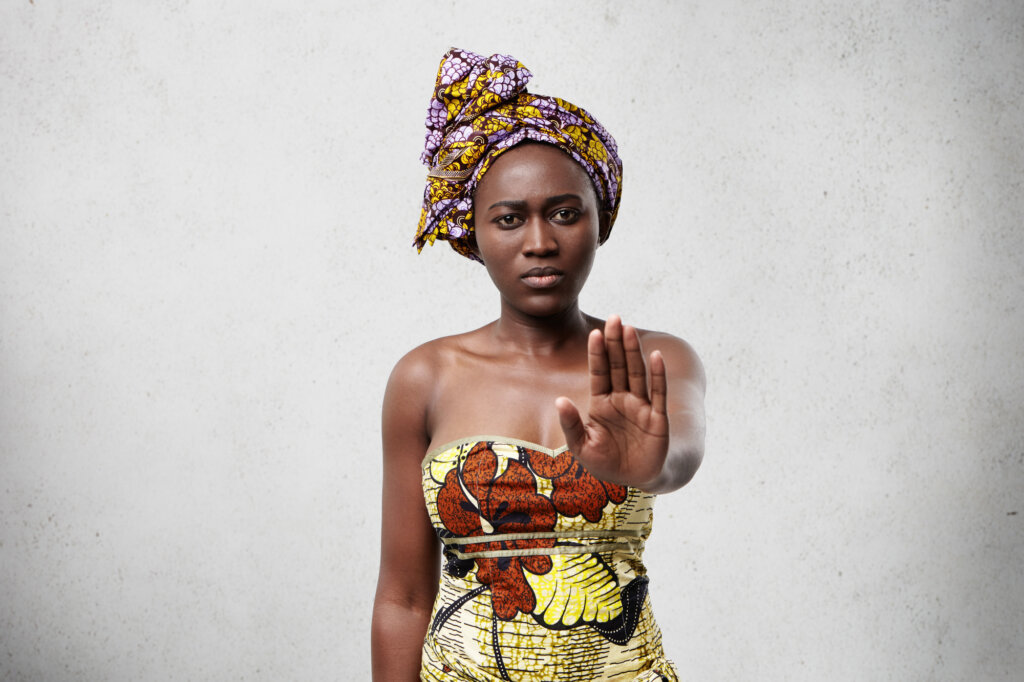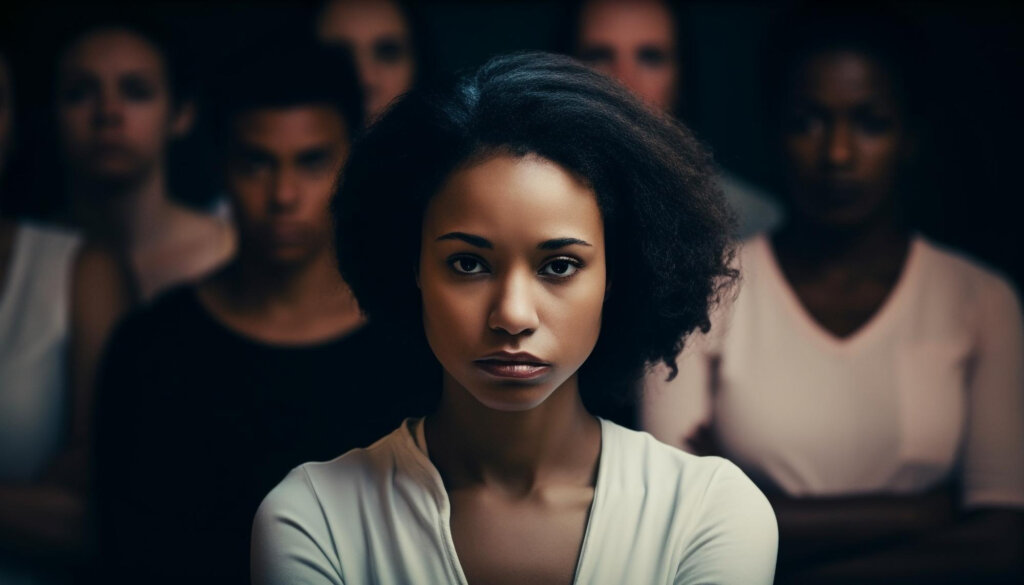Do men genuinely harbour hatred towards women? Why do we ask, “What did she do to deserve this?” so often? These questions have become disconcertingly common on Twitter in recent weeks, prompting deep reflection on the state of affairs in Nigeria. Witnessing the daily endurance of prevalent misogyny and the utter disregard for the law in Nigeria is disheartening.
Scrolling through our phones after a long day at work, seeking relaxation and updates on current events, has lost its appeal. Instead, a relentless stream of distressing news stories often confronts us, with a woman – unsuspecting, unassuming, and exhausted – at the heart of it all.
The shocking reality of gender-based violence (GBV).
Nigeria, standing as Africa’s most populous nation, is unfortunately not impervious to the deeply rooted problem of gender-based violence. As highlighted by a 2018 study from the Nigerian Demographic and Health Survey (NDHS), an alarming 31 percent of women aged 15-49 have faced physical violence, while 9 percent have endured sexual violence. Shockingly, these statistics also unveil an 11 percent surge in violence since the 2013 study, signalling a troubling trajectory.

The gravity of this issue on a global scale is underscored by the United Nations Office on Drugs and Crime (UNODC), which disclosed that 87,000 women were intentionally killed in 2017. Of these, 58 percent tragically fell prey to intimate partners or family members. These staggering figures paint a vivid picture of the enormity of the problem, with 137 women worldwide losing their lives at the hands of a family member every single day.
The Lagos State government, through Permanent Secretary and Solicitor-General Titilayo Shitta-Bey, revealed a staggering 5,624 cases of sexual abuse between August 2022 and July 2023, underscoring the enormity of the challenge. The Lagos State Domestic and Sexual Violence Agency meticulously categorized these cases, with an average of 250 clients seeking assistance monthly. Adult survivors comprised 91 percent females and 9 percent males, while 45 percent of affected children were boys and 55 percent were girls. Disturbingly, seven individuals with disabilities experienced gender-based violence during this period. Of the total cases, 2,588 involved children, prompting the initiation of counselling programs to help them overcome the trauma. Notably, the youngest victim was an 18-month-old baby, emphasizing the severity of sexual violence—an urgent global concern that Nigeria declared a state of emergency on in 2020.
Recent cases: A terrifying snapshot.
During the Covid-19 pandemic, women and girls globally faced a surge in sexual and physical violence. Incidents such as honour killings in Asia and the Middle East, genital mutilation in West Africa, and the rape of young girls in Southern Africa in the misguided belief that it could cure diseases underscored the unprecedented challenges. A majority of Nigerian women experienced various forms of gender-based violence, according to this study, with factors like age, employment, education, family background, and attitudes toward violence contributing to the prevalence. The health consequences of such violence ranged from sexually transmitted diseases, unwanted pregnancies, and physical injuries to immediate psychological reactions and long-term outcomes such as depression and post-traumatic stress disorder.

Since August, we’ve witnessed an alarming surge in gender-based violence cases, a disturbing trend largely overlooked by law enforcement agencies. These harrowing incidents often surface on social media, casting a grim light on the pervasive issue.
Take Augusta Osedion, a 21-year-old medical student in her fourth year, who was tragically murdered by her long-term boyfriend, Benjamin Best, known by the alias “Killaboi.” Shockingly, a few days after committing this heinous act, Benjamin Best admitted to stabbing Augusta on his Instagram story, attributing it to a “mistake” in the heat of a fight and expressing regret. More astonishingly, Benjamin Best remains free, actively posting on his social media accounts and even deflecting blame onto Augusta’s mother.
Then there’s the case of Omoefe Sodeje, brutally beaten by her ex-fiancé, Godspower Owutuamo, simply because she refused to marry him. In January 2023, Omoefe discovered that Godspower was deceitful about being divorced and having three children, prompting her to call off their wedding. In September 2023, Godspower offered her a ride home after she received a call to supply diesel, and she unsuspectingly agreed. However, he drove her to an unknown location, where he savagely beat her, proclaiming, “If I can’t marry you, no one else will.” Omoefe collapsed but was fortunately discovered and rushed to the hospital for treatment.
Another chilling case unfolded on September 22nd in Ugheli North Local Government area of Delta state, where an unidentified girl fell victim to the violence of Pastor Alex Itedjere. The motives behind this killing remain shrouded in mystery, emphasizing the tragic reality that a man claimed another life.
Two weeks ago, authorities arrested Olaniran Lateef, a secondary school teacher in Ogun state, for raping two girls, adding to this grim roster. One brave lady had reported the incident, leading the police to his house, where they caught him in the act of raping another young lady.
The sheer brutality of these cases is unfathomable, and what’s even more disturbing is the justifications some individuals offer for these crimes. In Augusta’s case, many men on Twitter shared unwarranted opinions suggesting that Augusta followed Benjamin Best for a glamorous lifestyle and somehow deserved to be killed.
These narratives underscore a pressing need for heightened awareness, urgent intervention, and a collective commitment to dismantling the structures that perpetuate such violence. The stories of Augusta, Omoefe, the unidentified girl, and others demand not just our attention but a collective call to action against the insidious threat of gender-based violence.
The rise of toxic ideologies.
Week after week, narratives burden our collective consciousness, depicting the harrowing consequences women face for simply rejecting advances. The recent tragic incident involving a 15-year-old schoolgirl stabbed in the neck after spurning a 16-year-old boy’s romantic overtures is both profoundly distressing and sadly familiar. In her courageous act of saying no, this young girl, regrettably, did not survive her injuries.
The poignant saying, “Men are afraid that women will laugh at them. Women are afraid that men will kill them,” serves as an unsettling reminder of the tangible, daily dangers women grapple with. It compels us to reflect on troubling questions: Why does a woman’s refusal too often come at the cost of her safety? Why can’t men meet women’s rejections with peace rather than peril? Is it a crime to be a woman in a world where asserting boundaries can have dire consequences?
The troubling surge in femicides globally finds an accomplice in the proliferation of red pill podcasts and think pieces—platforms entrenched in toxic alpha male ideologies and misogyny. These channels, accessible to today’s youth, contribute to an alarming rise in gender-based violence, especially among individuals aged 11-19.
The normalisation of misogyny and the propagation of harmful gender role beliefs pose a significant threat. Delving into the historical context, gender roles have been wielded as tools of subjugation. Risk emerges as young minds internalize these ideologies, leading to attitudes that not only disrespect but can escalate to violence against women.
The fight against gender-based violence transcends gender; it’s a collective revolution requiring the active engagement of every individual. Each passing day unveils a new case, underscoring the persistent urgency of this struggle. In understanding the complexities and implications of these narratives, we must delve deeper into the societal structures that perpetuate such violence, fostering a collective responsibility to dismantle them.
Finding hope in justice and collective action.
In our quest for hope through the pursuit of justice, we draw inspiration from the triumphs women secure, like the recent sentencing of Oluwatoyin Salau’s murderer, Alex Glee, following the impactful events of the 2020 Black Lives Matter protest. These moments, beacons of resilience, prove that justice, though sometimes delayed, can indeed be achieved, transcending mere victories.
Yet, the simple plea from women is profound: to live without the constant shadow of violence. This stark reality, the relentless fear of potential violations, burdens countless women worldwide. Yet, our belief in transformative change is unwavering. It goes beyond holding those who compromise global safety accountable; it’s about rallying collective action to implore law enforcement agencies to fulfil their responsibilities, forging a world undeniably safer for women.

Navigating the landscape of media influence, we must scrutinise podcasts and shows perpetuating harmful rhetoric. If necessary, removing such platforms from streaming services becomes imperative to halt the dangerous spread of ideologies. Women’s freedom to reject advances and exit relationships without fear of violence is a shared responsibility, a collective call to action. We aim to turn this right from rhetoric into reality, shaping a world where women thrive without persistent threats.
In our commitment to building a safer world for women, collaboration with organisations actively combating sexual and gender-based violence is paramount. In Nigeria, where the prevalence of such atrocities is disheartening, we find inspiration in the impactful work of organisations like WARIF (Women at Risk International Foundation) and CEADER (Center for the Advancement of Development Rights). WARIF empowers survivors and breaks the cycle of violence through counselling services and educational programs. CEADER engages in community-based initiatives challenging deeply ingrained norms contributing to gender-based violence and fostering systemic change.
Strategic alliances with these organisations and others sharing a similar mission can amplify our collective efforts. By pooling resources, expertise, and influence, we address the root causes of gender-based violence, advocate for policy reforms, and create sustainable support systems for survivors. Together, we contribute to the broader movement working towards a society where women seek justice and live free from the persistent threats that have plagued them for far too long. By forging these partnerships, we can turn the tide against gender-based violence, fostering a future where the unwavering upholding of every woman’s right to safety and dignity is possible.

